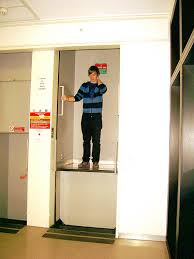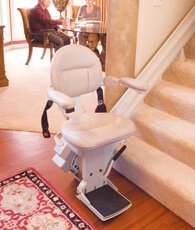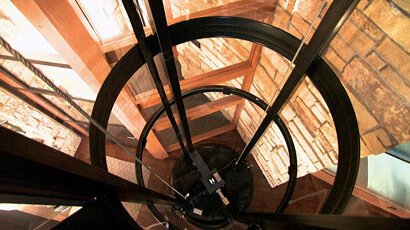 Paternosters are old-fashioned elevators that were once popular throughout Europe. They consist of two side-by-side elevator shafts and a chain of compartments. The shafts and compartments do not have doors. The compartments move continuously on an endless belt, similar to the way a Ferris wheel operates. The compartments go up one shaft and down the other. If a person stays in a compartment after it reaches the last floor in a building, it keeps going around and up or down the other shaft.
Paternosters are old-fashioned elevators that were once popular throughout Europe. They consist of two side-by-side elevator shafts and a chain of compartments. The shafts and compartments do not have doors. The compartments move continuously on an endless belt, similar to the way a Ferris wheel operates. The compartments go up one shaft and down the other. If a person stays in a compartment after it reaches the last floor in a building, it keeps going around and up or down the other shaft.
The name “paternoster” is derived from the Latin words for “our father.” These are the first two words in the Lord’s Prayer and refer to the way the elevator’s compartments move like a string of rosary beads in a person’s hand.
The paternoster was invented by Peter Ellis, a Liverpool architect, in the 1860s. The elevators used to be fairly common. All department stores in Germany used to have them, and there were many others in the country. There were approximately 70 in the Czech Republic in 2006. Many paternosters in England and other European countries were shut down in the second half of the 1900s due to safety concerns. They remained common in the Czech Republic, but some were taken out of service in the 1990s.
Some paternosters are still operating and open to the public. Several can be ridden in Prague, and private tours of the city’s paternosters are even available. Some are located at the office building U Novaku, the financial directorate (tax office), city council building, and Prague 7 council building. Germany still has a fair number of paternosters, but many are closed to the public. A European directive prohibits the construction of new paternosters.









